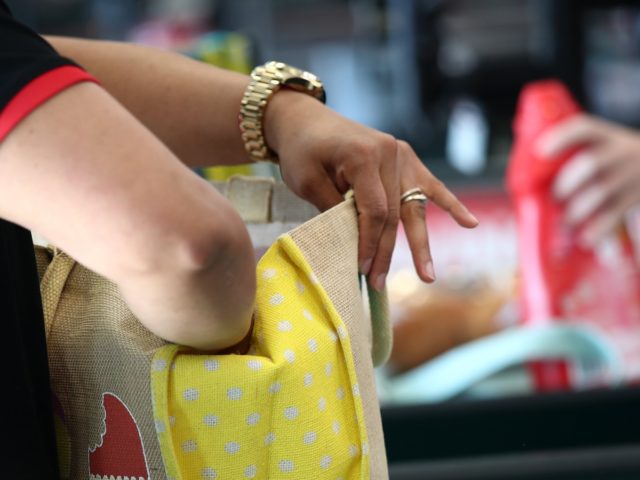Environmental groups are rejoicing as states such as California and Connecticut have resumed taxing their citizens for so-called single-use plastic bags, dismissing concerns reusable bags brought into stores from people’s homes will contribute to the spread of COVID-19.
“Reusables are not the culprit of spreading coronavirus,” Miriam Gordon, policy director for UPSTREAM, a nonprofit that seeks to reduce plastic pollution, told climate and environment publication Grist last week.
Gordon said fearmongering has exaggerated the risks of the contagious virus’s transmission through surface contact, citing the Centers for Disease Control and Prevention (CDC), though the agency has changed its recommendations multiple times throughout the pandemic.
As Grist observed, environmental group Greenpeace orchestrated a “health experts’ statement,” that counters what the group says are false claims of virus spread through reusables that have been perpetrated by organizations “with financial connections to oil and plastic companies” that “have tried to convince the public otherwise.”
However, the Greenpeace “health expert statement” begins with a statement about the environment, and not health:
Reuse and refill systems are an essential part of addressing the plastic pollution crisis and moving away from a fossil fuel-based economy. They can create jobs and help build local economies. The COVID-19 global pandemic has triggered a discussion of how to ensure the safety of reusable systems in a public health crisis. Based on the best available science and guidance from public health professionals, it is clear that reusable systems can be used safely by employing basic hygiene.
Greenpeace’s “health experts” base their statement on CDC’s June 16 statement titled, “How COVID-19 Spreads.”
CDC stated:
COVID-19 is thought to spread mainly through close contact from person-to-person. Some people without symptoms may be able to spread the virus. We are still learning about how the virus spreads and the severity of illness it causes.
Person-to-person spread
The virus is thought to spread mainly from person-to-person.
- Between people who are in close contact with one another (within about 6 feet).
- Through respiratory droplets produced when an infected person coughs, sneezes, or talks.
- These droplets can land in the mouths or noses of people who are nearby or possibly be inhaled into the lungs.
- COVID-19 may be spread by people who are not showing symptoms.
CDC also warns in the same statement, however:
The virus that causes COVID-19 is spreading very easily and sustainably between people.
The virus may be spread in other ways.
It may be possible that a person can get COVID-19 by touching a surface or object that has the virus on it and then touching their own mouth, nose, or possibly their eyes. This is not thought to be the main way the virus spreads, but we are still learning more about how this virus spreads.
Nevertheless, Gordon told Grist the theory that coronavirus can be spread through reusable bags coming from people’s homes is based on “junk science.”
Mark Murray, executive director of Californians Against Waste, also told msn.com, “[T]here was never any evidence that COVID could be or has been transmitted via reusable bags.”
Greenpeace’s “health experts” statement relies on individuals’ commitment to regular disinfection of their reusable shopping bags.
Additionally, the statement suggests new single-use bags that are provided by stores “could be contaminated with the virus,” though, obviously, they are not being brought into the store by thousands of individual shoppers who may or may not know if they have the virus.
While the environmental “health experts” largely dismiss the prospect of contracting COVID-19 through reusable bags, they also recommend “contact-free systems for customers’ personal bags and cups”:
Systems in which there is no contact between the customer’s reusable cup, container or bag and retail surface areas can protect workers and provide a precautionary approach to addressing COVID-19 transmission. For example, California’s Occupational Safety and Health Administration recommends that “when customers bring their own bags, employees should be instructed to:
- Not touch or place groceries in customer brought bags.
- Ask customers to leave their own bags in the shopping cart.
- Ask customers to bag their own groceries
Connecticut’s Department of Revenue Services recently reminded businesses they “should prepare to resume collection of the state-level plastic bag fee” that was re-enacted Wednesday. Retail businesses will now “be required to collect the plastic bag fee” at ten cents per bag.
The state says as well “the Department of Energy and Environmental Protection (DEEP) strongly encourages state residents who use reusable bags for shopping to continue to do so,” and “reusable bags do not serve as a significant source of infection for COVID-19.”
In March, Connecticut Gov. Ned Lamont (D) stopped the single-use bag tax in order “to mitigate the spread of COVID-19.”
The premise that plastic bag bans are actually better for the environment has also been challenged recently.
Just Facts produced a video last August demonstrating that plastic bags are actually better for the environment than paper and reusable bags.
A study published at the Journal of Environmental Economics and Management also found that plastic bag bans actually do not significantly reduce waste.
According to the study, results revealed “12–22% of plastic carryout bags were reused as trash bags pre-regulation and show bag bans shift consumers towards fewer but heavier bags.”
The researchers defined as “leakage” what “occurs when partial regulation of consumer products results in increased consumption of these products in unregulated domains.”
“With a substantial proportion of carryout bags already reused in a way that avoided the manufacture and purchase of another plastic bag, policy evaluations that ignore leakage effects overstate the regulation’s welfare gains,” the study observed.

COMMENTS
Please let us know if you're having issues with commenting.